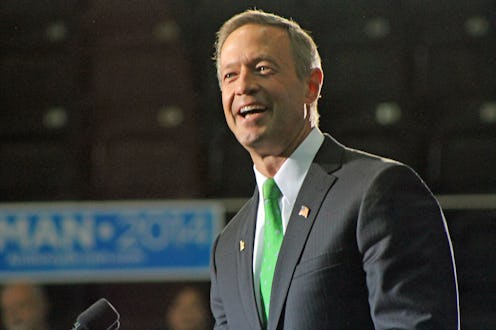News
O'Malley Apology Previews Justice Reform Plan

Martin O'Malley had probably planned to cover a laundry list of social and political issues while he was speaking at the annual Netroots Nation conference this weekend. Certainly, the Democratic candidate for president could have used the time to talk through his plan for immigration reform, Wall Street reform, debt-free access to college, or addressing climate change. The gathering is a haven for liberal activists and left-leaning politicos — the people most eager to understand the subtle differences between O'Malley and the other Democratic candidates. Instead, because of a tone-deaf remark the candidate made regarding police violence in black communities, O'Malley apologized for his now famous "all lives matter" comment and previewed his criminal justice agenda at Netroots — though, perhaps a little earlier than he intended.
During a demonstration by mostly black audience members who erupted during his on-stage interview with journalist Jose Antonio Vargas, O'Malley derailed his message on police brutality with the very worst thing a white man could say under the circumstances: "Black lives matter. White lives matter. All lives matter." Because of that critical misstep, O'Malley instead spent much of his time at the gathering focused on an issue that his campaign has framed as one of the key themes of O'Malley's candidacy. During his interview with L. Joy Williams of digital news site This Week In Blackness (TWiB), O'Malley tried to apologize for his misstep by previewing his platform on criminal justice reform and police brutality — including the two major reform issues that he regrets leaving unfinished as governor of Maryland.
As a presidential candidate, O'Malley has leaned on his record as Baltimore's tough-on-crime mayor and Maryland's governor during a statewide crackdown on homicides as evidence of the kind of criminal justice reform he would bring to the nation as president. According to The Baltimore Sun, O'Malley's approach to eliminating crime involved aggressively policing minor infractions in order to tamp down the city's notoriously high rates of homicide and violent crime. In an interview posted on YouTube, O'Malley on Saturday told Williams that part of his responsibility as mayor had been to bring awareness of the disparate impact of Baltimore's crime rates on black residents.
Many years ago when I ran for mayor of Baltimore (a majority African American city), when we had allowed ourselves to become the most violent, part of what I called us to as a people, was to the justice of realizing that yes, black lives matter. And when we allow ourselves to assume that every year as a city, we just have to accept that 300 young black men will die violent deaths, we have to do a checkup from the neck up and realize as a people that if 300 young, poor white men were dying, we would have a different reaction to this as a state and as a metro area and as a city.
The Sun reported that after O'Malley introduced his new approach, killings in Baltimore dipped to 253 in 2003 from a consistent 300 homicides or more annually over the prior 10-year period. In 2005, city police made more than 100,000 arrests, a year during which Baltimore only had a population of 636,000. Critics have argued that O'Malley's zero-tolerance policies led to gross mistreatment of black men in Baltimore and helped spur the distrust that erupted in the city after the death of Freddie Gray earlier this spring.
During his interview at the Netroots Conference, O'Malley acknowledged his administration had fallen short in at least two critical areas of reforming the state's criminal justice system. But, rather than discussing the role his policies might have played in encouraging distrust between police and the community, O'Malley hit on how he planned to use Maryland's missed opportunities in criminal justice reform to adjust his vision for a national agenda on policing. So, what will be in Martin O'Malley's criminal justice platform? The presidential candidate offered three potential policy solutions during his interview with This Week In Blackness.
Addressing Record Expungement For Certain Felony Convictions
In his interview, O'Malley mentioned the need to do fewer things that make people unemployable after they leave the criminal justice system. The issue of expungement has gained traction as a national issue, since having a criminal record can keep former offenders from attending college, getting jobs, and exercising their right to vote.
Requiring Body Cameras And Uniform Data Collection On Police-Involved Shootings
O'Malley is known for his use of objective data as a way to measure policy impact. It makes sense that he would appreciate body cameras and greater use of statistics as a way to bring more accountability and transparency to measuring officer behavior.
Examining Federal Drug Sentencing Guidelines
O'Malley told the TWiB host that he didn't understand the sentencing disparities between possession of powder cocaine and crack cocaine. In fact, the differences in sentencing for drug offenses has been cited as a leading cause for the deep racial disparities in who actually goes to prison in America.
Images: Karen Murphy, Mike Smith, SocialJusticeSeeker812, National Crime Agency/Flickr